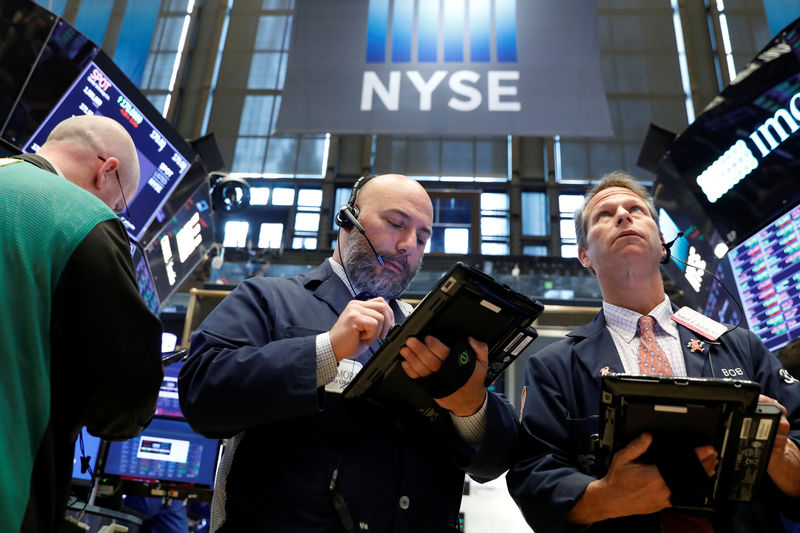By Sinéad Carew
NEW YORK (Reuters) - U.S. investors expect banks and other financial institutions to announce large returns of capital to shareholders after the Federal Reserve publishes the first set of results from its annual “stress test” late Thursday.
Even so, gains in financial shares may be muted. Many of the 38 financial companies undergoing the test are expected to boost dividends and share buybacks as a result of higher profits on the back of tax cuts and rising net interest income.
Banks will be able to unveil capital return plans for the coming year next week after the Fed issues its second set of results that determine how much of a capital buffer the banks need.
The Fed examines the health of the balance sheets of the biggest financial companies every year to ensure that they have enough capital to withstand a shock to the system like the ones that brought down a number of banks during the 2007-09 financial crisis.
"General headlines will be constructive with the vast majority of banks increasing their dividends and buying back more stock," said Jason Goldberg, a bank analyst at Barclays (LON:BARC).
Goldberg estimates that the 22 banks he covers should be able to announce returns of 103 percent of earnings compared with an estimated 86 percent for the year that ends in June.
Celebrations may be somewhat overshadowed, however, by loan growth data and a flattening yield curve, according to Sameer Samana, global equity and technical strategist at Wells Fargo Investment Institute in St. Louis.
"(Stress test results) could be a catalyst for a day or two but it'll still come back to the main driver, which is going to be the yield curve and loan growth, which has been OK but nothing to write home about," said Samana.
Bank profits are boosted by a steepening yield curve, when the gap widens between short-dated Treasury yields and long-dated Treasury yields. Banks profit from the difference between short-term rates, which determine their borrowing costs, and long-term rates, which affect how much they can charge for loans such as mortgages.
The spread between U.S. Treasuries 2-year and 10-year yields
On June 29 last year, after banks released their capital plans following the stress test, the S&P 500 bank index <.SPXBK> ended the day 1.8 percent higher.
Last year's approval marked the first time since the financial crisis the industry was given the go ahead to pay out as much as it reports in annual profits.
The largest U.S. banks have notably underperformed their smaller, regional rivals so far in 2018. (Graphic: https://reut.rs/2K4QtUj)
The S&P 500 bank index was last showing a year-to-date decline of 2.4 percent after gaining 20 percent in 2017. In comparison the KBW Regional Bank index (KRX) is up 8.4 percent for the year after falling 0.3 percent last year.
For this year's returns, Keefe Bruyette & Woods analysts in research reports cut their payout assumptions for the median bank to 102 percent of earnings compared with a previous expectation for 120 percent as the stress test was tougher than they had originally expected.
KBW analysts said they were optimistic about payouts from banks including Citigroup Inc (N:C), Bank of America Corp (N:BAC), Wells Fargo & Co (N:WFC), BB&T Corp (N:BBT), Huntington Bancshares Inc (O:HBAN), Comerica Inc (N:CMA), Citizens Financial Group Inc (N:CFG), Zions Bancorp (O:ZION) and asset manager Northern Trust Corp (O:NTRS).
The firm has cautious views on capital payouts by companies including Goldman Sachs Group Inc (N:GS), Fifth Third Bancorp (O:FITB), KeyCorp (N:KEY), Regions Financial Corp (N:RF), CIT Group Inc (N:CIT), SunTrust Banks Inc (N:STI), Ally Financial Inc (N:ALLY), American Express Co (N:AXP), Capital One Financial Corp (N:COF), Discover Financial Services (N:DFS) and M&T Bank Corp (N:MTB).
The U.S. operations of Deutsche Bank AG (DE:DBKGn) (N:DB) could face a challenging stress test. Standard & Poor's recently downgraded the company's credit rating after reports the Fed designated one of its U.S. businesses as "troubled" last year.
It could be difficult for a bank with a subsidiary on the "troubled" list to pass the scenarios, a person familiar with the tests who was not authorized to speak publicly told Reuters.
Bernstein analyst John McDonald in a report said he expects capital return dollars to grow but added he does not think everybody will increase payout dollars as "firms are up against a harsher test and many have lower starting capital positions."
Payout levels and market reactions will vary from bank to bank, according to Mike Mattioli, portfolio manager at Manulife Asset Management in Boston.
"I don't think it'll be a major catalyst. The thing people will be looking for is if anybody failed," said Mattioli. "There'll be some surprises on the upside or the downside, but it shouldn't move stocks in double-digit percentage changes."
